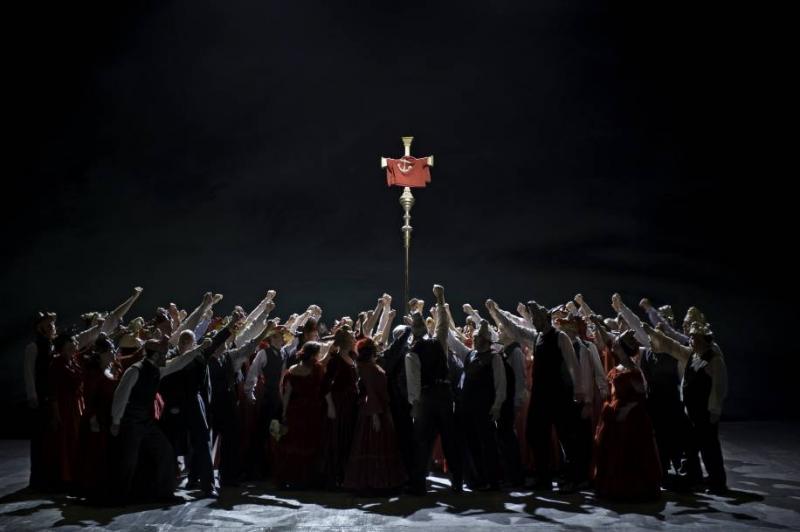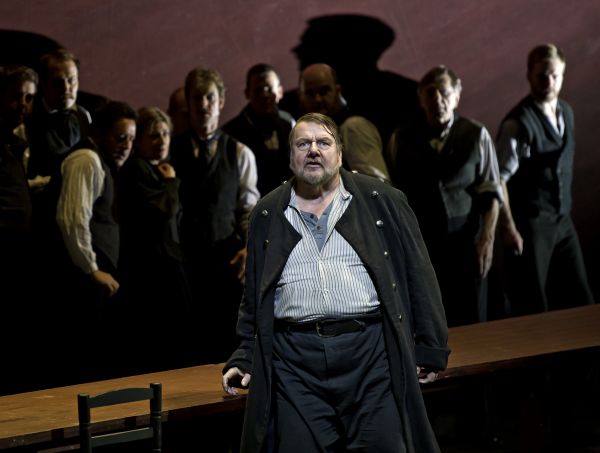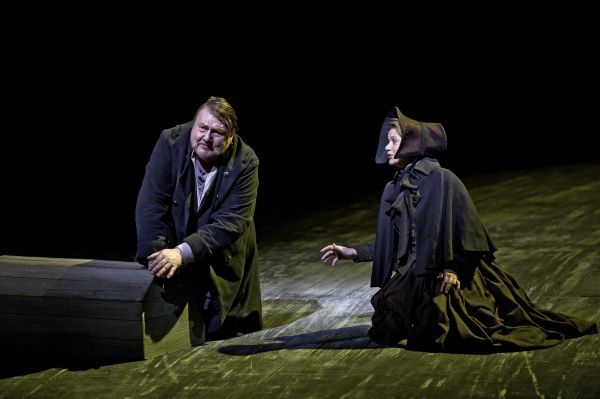Peter Grimes, Royal Opera | reviews, news & interviews
Peter Grimes, Royal Opera
Peter Grimes, Royal Opera
This revival makes a vivid visual statement but of what is unclear

It’s the oldest coup de théâtre in the postmodernist playbook – the curtain rises to reveal an audience staring back at us – but still, in the opening seconds of Willy Decker’s Peter Grimes, one of the most effective. Our theatrical doubles here are sinister creatures indeed, massed rows of sombre Victorians whose brutal Christianity is no less severe than the angles of John Macfarlane’s set.
Returning for its first Covent Garden revival (directed by François de Carpentries), Willy Decker’s Peter Grimes has lost none of its visual aplomb. Starkly monumental, his sets might feel token were it not for the fitness of their scope to Britten’s musical vision. The claustrophobic world of Crabbe’s poem cannot remain sealed in the face of the elemental energy of Britten’s sea, a force that finds its mirror in the deconstructed spaces of Macfarlane’s designs. By angling his stage steeply down to the pit he creates a sense of the action flowing outwards, propelled perpetually onward to its grim conclusion.
Some canny costuming also helps to characterise the Borough – that greatest villain of the piece. All is grey and muted, characters blurring and bleeding into one another: a community whose minds and morals, we must assume, are equally indistinguishable. Only Auntie and the Nieces stand apart, their deviancy writ scarlet in their clothing.
 Peter Grimes is above all a tale of community, and stands or crumbles with its chorus. Minutely rehearsed and wielding some serious power, the Royal Opera House Chorus drives the musical drama, steering a neat course through the hairpin bends of "Old Joe has Gone Fishing", and climaxing in those most chilling cries of “Peter Grimes”. Choreographed by Athol Farmer (Ruth Moss in revival), they coil and writhe as one, sketching out visually their intentions and alliances.
Peter Grimes is above all a tale of community, and stands or crumbles with its chorus. Minutely rehearsed and wielding some serious power, the Royal Opera House Chorus drives the musical drama, steering a neat course through the hairpin bends of "Old Joe has Gone Fishing", and climaxing in those most chilling cries of “Peter Grimes”. Choreographed by Athol Farmer (Ruth Moss in revival), they coil and writhe as one, sketching out visually their intentions and alliances.
In the pit Andrew Davis offers similarly incisive energy, though texturally things sound a little thin at times, failing to fill Interlude VI with quite the urgency Edward Gardner and the ENO mustered in their recent account, losing ensemble in some of the more exposed passages of chordal woodwind writing.
There’s a certain anxiety these days that goes along with seeing Ben Heppner’s (pictured above) name on a cast list. Vocal issues have lingered, and while at his best there’s no doubting his quality, too often the voice sounds ailing or just plain knackered. Grimes is not a forgiving role technically, the soft-spun intensity of "Now the Great Bear" leaves nowhere to hide, and on opening night was dismally flat. I could even forgive issues of intonation (which worsened as we progressed), were there any of the colour and characterisation Vickers channelled so memorably into his singing, but as things get tighter and more pushed at the top we lose anything but the most functional of noises. Dramatically Heppner’s Grimes has always been touching, but even here is now in danger of being outclassed by Stuart Skelton, whose faltering man-child “born to blocks, spars and ropes” turns that screw that little bit further.
 Amanda Roocroft (pictured left with Heppner), recently so glorious in The Makropulos Case, was also a little disappointing as schoolmistress Ellen Orford. Crafting an unusually gutsy tenderness out of Ellen’s music, it is only in the highest register that her vibrato widens to extremes, leaving the sound more than a little snatched and without the control that colours the rest of the voice. Catherine Wyn-Rogers’s Auntie is a more solid affair, and the quartet for the Borough female outcasts (with Rebecca Bottone and Anna Devin as the Nieces) an unusual highlight. Among the starry array of bit-part men, it is Roderick Williams’s Keene and Martyn Hill’s understatedly comic Rector that push through the dramatic texture, providing the human faces in Decker’s determinedly faceless crowd.
Amanda Roocroft (pictured left with Heppner), recently so glorious in The Makropulos Case, was also a little disappointing as schoolmistress Ellen Orford. Crafting an unusually gutsy tenderness out of Ellen’s music, it is only in the highest register that her vibrato widens to extremes, leaving the sound more than a little snatched and without the control that colours the rest of the voice. Catherine Wyn-Rogers’s Auntie is a more solid affair, and the quartet for the Borough female outcasts (with Rebecca Bottone and Anna Devin as the Nieces) an unusual highlight. Among the starry array of bit-part men, it is Roderick Williams’s Keene and Martyn Hill’s understatedly comic Rector that push through the dramatic texture, providing the human faces in Decker’s determinedly faceless crowd.
There will doubtless be those in the audience still hankering after the Moshinsky Grimes that Decker’s has displaced, dissatisfied with the broad gestures and rather inconclusive approach to the material. While clarity of character is lacking here, the space of the production – both physically and conceptually – offers the audience an associative collage of images from which to craft our conclusions, whether for good or ill.
Explore topics
Share this article
The future of Arts Journalism
You can stop theartsdesk.com closing!
We urgently need financing to survive. Our fundraising drive has thus far raised £49,000 but we need to reach £100,000 or we will be forced to close. Please contribute here: https://gofund.me/c3f6033d
And if you can forward this information to anyone who might assist, we’d be grateful.

Subscribe to theartsdesk.com
Thank you for continuing to read our work on theartsdesk.com. For unlimited access to every article in its entirety, including our archive of more than 15,000 pieces, we're asking for £5 per month or £40 per year. We feel it's a very good deal, and hope you do too.
To take a subscription now simply click here.
And if you're looking for that extra gift for a friend or family member, why not treat them to a theartsdesk.com gift subscription?
more Opera
 Susanna, Opera North review - hybrid staging of a Handel oratorio
Dance and signing complement outstanding singing in a story of virtue rewarded
Susanna, Opera North review - hybrid staging of a Handel oratorio
Dance and signing complement outstanding singing in a story of virtue rewarded
 Ariodante, Opéra Garnier, Paris review - a blast of Baroque beauty
A near-perfect night at the opera
Ariodante, Opéra Garnier, Paris review - a blast of Baroque beauty
A near-perfect night at the opera
 Cinderella/La Cenerentola, English National Opera review - the truth behind the tinsel
Appealing performances cut through hyperactive stagecraft
Cinderella/La Cenerentola, English National Opera review - the truth behind the tinsel
Appealing performances cut through hyperactive stagecraft
 Tosca, Royal Opera review - Ailyn Pérez steps in as the most vivid of divas
Jakub Hrůša’s multicoloured Puccini last night found a soprano to match
Tosca, Royal Opera review - Ailyn Pérez steps in as the most vivid of divas
Jakub Hrůša’s multicoloured Puccini last night found a soprano to match
 Tosca, Welsh National Opera review - a great company reduced to brilliance
The old warhorse made special by the basics
Tosca, Welsh National Opera review - a great company reduced to brilliance
The old warhorse made special by the basics
 BBC Proms: The Marriage of Figaro, Glyndebourne Festival review - merriment and menace
Strong Proms transfer for a robust and affecting show
BBC Proms: The Marriage of Figaro, Glyndebourne Festival review - merriment and menace
Strong Proms transfer for a robust and affecting show
 BBC Proms: Suor Angelica, LSO, Pappano review - earthly passion, heavenly grief
A Sister to remember blesses Puccini's convent tragedy
BBC Proms: Suor Angelica, LSO, Pappano review - earthly passion, heavenly grief
A Sister to remember blesses Puccini's convent tragedy
 Orpheus and Eurydice, Opera Queensland/SCO, Edinburgh International Festival 2025 review - dazzling, but distracting
Eye-popping acrobatics don’t always assist in Gluck’s quest for operatic truth
Orpheus and Eurydice, Opera Queensland/SCO, Edinburgh International Festival 2025 review - dazzling, but distracting
Eye-popping acrobatics don’t always assist in Gluck’s quest for operatic truth
 MARS, Irish National Opera review - silly space oddity with fun stretches
Cast, orchestra and production give Jennifer Walshe’s bold collage their all
MARS, Irish National Opera review - silly space oddity with fun stretches
Cast, orchestra and production give Jennifer Walshe’s bold collage their all
 Káťa Kabanová, Glyndebourne review - emotional concentration in a salle modulable
Janáček superbly done through or in spite of the symbolism
Káťa Kabanová, Glyndebourne review - emotional concentration in a salle modulable
Janáček superbly done through or in spite of the symbolism
 Buxton International Festival 2025 review - a lavish offering of smaller-scale work
Allison Cook stands out in a fascinating integrated double bill of Bernstein and Poulenc
Buxton International Festival 2025 review - a lavish offering of smaller-scale work
Allison Cook stands out in a fascinating integrated double bill of Bernstein and Poulenc
 Tosca, Clonter Opera review - beauty and integrity in miniature
Happy surprises and a convincing interpretation of Puccini for today
Tosca, Clonter Opera review - beauty and integrity in miniature
Happy surprises and a convincing interpretation of Puccini for today

Add comment